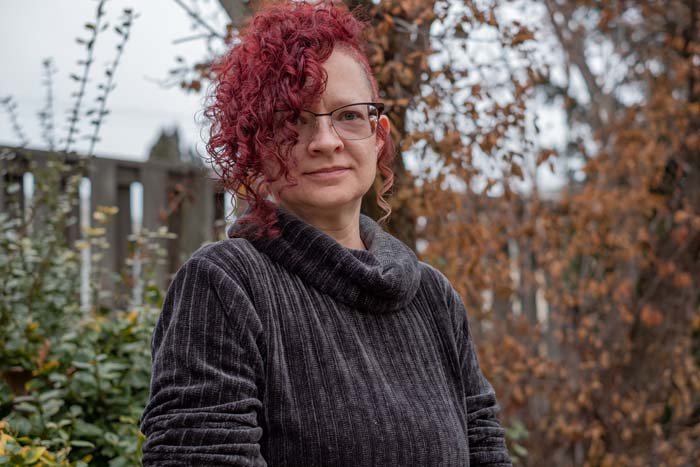Good Shepherd Health Care System terminates care for nonbinary patient
Published 7:00 am Tuesday, March 21, 2023

- Rae Galloway of Hermiston talks Tuesday, Feb. 7, 2023, about the lack of appropriate pronouns used at their former health care clinic in correlation to a patient's identity.
HERMISTON — After being terminated two months ago as a Good Shepherd Primary Care Clinic patient, Rae Galloway has been left with no option but to find another provider.
Galloway, who is nonbinary and uses they/them pronouns, learned of the decision in a Jan. 4 letter to them and their family issued by practice manager Mellyssa Seewer at the Good Shepherd Medical Group’s Primary Care Clinic.
“Because of the extreme lack of trust you have voiced for the Primary Care Clinic and staff,” it reads, “patient care through the clinic, for you and your family, will be terminated 30 days from the date of this letter.”
Galloway was dumbfounded.
“The fact that they terminated my spouse and my kids, who didn’t even see the same provider,” Galloway said. “Why they did that — I just don’t understand.”
Good Shepherd communications director Caitlin Cozad said the hospital does not comment on patients’ protected health information.
“GSHCS is committed to inclusivity and providing compassionate, high-quality care to our patients,” she added.
Providers and pronouns
Galloway said they came out in the summer of 2022 while seeing a primary care provider with whom they were familiar. After the provider left to take maternity leave,
Galloway developed a shingles infection and sought assistance.
“The first provider that I saw was incredibly disrespectful and ignored my pronouns and name,” Galloway said. “I complained about them and saw someone else in the same office, and that went better. It felt more affirming.”
At least, until Galloway read their provider’s chart notes. Once again, Galloway said, they had been misgendered and “deadnamed,” a term to describe when a transgender person is called by their birth name following a gender-transition name change. At that point, they said they decided to contact the clinic’s administration, intending to set the record straight.
“I got a response from Good Shepherd, from the chief medical officer, and they apologized for the pronoun mess-ups and whatnot,” Galloway recalled. “But that’s all I ever really heard from them. They didn’t really fix anything.”
Eventually, Galloway’s original care provider, who was familiar with Galloway before they came out as nonbinary, returned from her maternity leave.
“I think perhaps my change of pronouns took her off-balance a little, though I was hoping our established relationship would help,” they said. “It did not.”
According to Galloway, while the Good Shepherd clinic staff was affirming, their provider was not. After using the patient’s previous name and incorrect pronouns, Galloway said, their provider was disrespectful toward their identity.
After deciding to stand up for themself, Galloway said they were informed of their termination.
Good Shepherd staff trains on the issue
Good Shepherd’s letter was dated Jan. 4, just one day before its “Understanding Sexual Orientation & Gender Identity to Improve Patient Health” training session on the treatment of transgender patients and patients of various sexual orientations.
Spearheaded by the Oregon AIDS Education and Training Center, it intended to improve health outcomes for Two-Spirit (those who combine traits of men and women) and LGBTQIA+ patients.
“The goal of the training course was to understand sexual orientation and gender identity to improve patient health,” Cozad said. “As always, Good Shepherd’s aim is to provide access to care in a welcoming environment that demonstrates respect and value for all patients.”
Oregon AETC Program Manager Dayna Morrison led the presentation, directing ways for providers to make patients feel more affirmed.
“In health care environments, we really have a lot of power to address the way we interact with other people and the structures we might have in our environment that can make people feel safe or not so safe,” Morrison said at the Jan. 5 session.
The two-hour class covered how discrimination against patients based on sexual orientation or gender identity can be accidental but still damaging.
“Sixty-nine percent of nonbinary people and 62% of transgender people were discriminated against in a health care setting last year,” Morrison said.
She continued to list examples of discriminatory actions by providers — visible discomfort, harsh language and intentional misgendering, among others. She added that a patient’s gender identity was not a preference, and that it shouldn’t be seen as such.
Galloway said they attended the session and vocalized
their own experience with
discrimination.
Moving forward
Galloway said they used to be a medical student and had performed much of their third- and fourth-year clinical rotations within the Good Shepherd Medical Group.
“It’s different coming from when I was a med student,” they said. “Everyone would bend over backward if I ever had something medical going on. As soon as I come out as queer, the treatment becomes very different. It’s just frustrating because this isn’t the kind of doctor I would have been.”
Moving forward, Galloway said they’ve heard only radio silence from the medical group after attempts to reach out, with their spouse leaving multiple voicemails to the practice manager who wrote the termination letter, as well as to GSMG administration.
Although disheartened by the lack of response, Galloway is keeping their head up.
“I feel like I have more resources than most other queer folk, especially in this area,” they said. “So I’d rather make a little noise myself and maybe try to change something, rather than just push it back under the rug.
“I just don’t want this to happen to someone else.”





